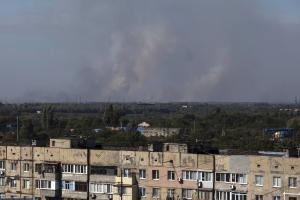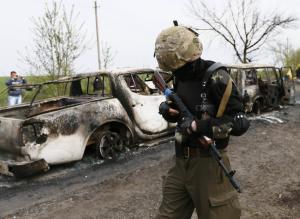By Thomas Grove
DONETSK Ukraine (Reuters) - Pro-Russian rebels voted in an election to set up a separatist leadership in eastern Ukraine on Sunday, taking the war-torn region closer to Russia and defying Kiev and the West, as shelling continued across the territory.
The United States and European Union have denounced the vote as illegitimate, which is sure to stoke tensions further between the West and Russia.
The separatists' election of a leader and People's Council is the latest twist in a face-off between Russia and the West that started with Ukraine's ouster of a Moscow-backed president in February and the installation of a pro-European leadership.
In Donetsk, eastern Ukraine's former industrial capital and the separatists' political and military stronghold, Soviet music blared out of speakers in front of a central voting station carrying the separatist's red black and blue flag.
Across the region suffering from years of neglect and months of war between Ukrainian forces and pro-Russian rebels, people stood in freezing temperatures to cast their vote in some places near the remains of shrapnel from mortar bombings.
"We are citizens of Donetsk, and we don't want to live under the Kiev government that has turned its back on us," said Sergei Kovalenko, 58, a private security guard who came to vote with his wife at a polling station set up at an elementary school.
People brought truck loads of carrots, potatoes and cabbages to polling stations where they were sold off for pennies to those waiting in line.
Some of the heaviest artillery shelling of the past few weeks could be heard in the predominantly Russian-speaking area hours before voting was to begin. Rebels said more artillery was heard in a northern district of Donetsk during the vote.
View gallery

Smoke rises in the sky after shelling on the outskirts of Donetsk, eastern Ukraine, September 20, 20 …
Ukraine's military said three of its soldiers had been killed in the past 24 hours, two of them by an explosion at a check point near the city of Mariupol, which is under Ukrainian control.
Kiev says the vote in its Donetsk and Luhansk regions violates a series of agreements known as the Minsk protocol that underpins a Sept. 5 ceasefire between the rebels and Kiev.
Although sporadically broken, the truce has allowed a semblance of normality to return to Donetsk following violence that has killed more than 4,000 people in the region.
Kiev says the agreements, signed by rebel leaders and envoys from Kiev, Russia and the Organization for Security and Cooperation in Europe (OSCE), arrange for elections held under Ukrainian law that would appoint purely local officials.
But the rebels' plan to elect leaders and institutions in a breakaway territory in the regions of Donetsk and neighboring Luhansk violates that agreement, Kiev says.
FIGHT OVER LEGITIMACY
The poll will further strain relations between the West and Russia after Russian Foreign Minister Sergei Lavrov said Moscow would recognize the vote. On Friday, German Chancellor Angela Merkel told Russian President Vladimir Putin the election was illegitimate and would not be recognized by Europe.
Alexander Zakharchenko, the current rebel prime minister whose campaign advertisements are plastered across Donetsk, is almost certain to win the vote for the leadership of the self-proclaimed Donetsk People's Republic.
View gallery

A Pro-Russian militant walks past burnt cars near a checkpoint that was the scene of a gunfight over …
A 38-year-old former mining electrician who uses colorful language in a heavy local accent, Zakharchenko has compared the region's coal deposits to the oil reserves in the United Arab Emirates and has promised pensioners a stipend that will allow them to go on safari in Australia.
Wearing a dark suit rather than his usual military fatigues, Zakharchenko dropped his vote into a ballot box at a polling station at a local school.
"For justice, happiness, peace and prosperity," he said.
His opponents, two lesser known separatist figures, have rarely appeared in public. Public bulletins of the three candidates made no mention of the policies they endorse, but rather just listed biographical information.
"He doesn't eat, he doesn't sleep. He works only for us 150 percent of the time," said Lyudmila Kovalenko, who works at a school. She said the rebel leadership had fixed the windows of the school after it was hit by a mortar.
Rebels say the election will legitimize the separatist leadership and consolidate power in the midst of a humanitarian crisis which will only be worsened by the oncoming winter.
Rebels have sought to legitimize the vote by bringing in outside observers from Europe and the Russian-backed regions of South Ossetia and Abkhazia, which like Donetsk and Luhansk broke off from the former Soviet republic of Georgia.
"FOR THE REBELS THEMSELVES"
An exit poll monitor, Natalia Samostrokova, 35, said that by noon Zakharchenko was winning with some "90 percent of the vote and then some" as she scanned the results of her survey in a voting station in Makiyivka, east of Donetsk.
Enthusiasm for the rebel cause, which was at its peak in Ukraine's Russian-speaking east following the ouster of Moscow-backed Viktor Yanukovich, waned after violence closed banks and many stores, forcing people out of work.
Voting stations drew a steady stream of people on Sunday.
"The number of voters is no less than in the referendum. In fact I've never seen such a large number of people coming out to vote," said Olga Zakharchenko, 48, a teacher who said she was no relation to the rebel leader.
Even so, many Donetsk residents say the vote will change nothing and that the validity of the election is in question given there are no voters lists and includes Internet voting and mobile polling stations,
"I don't see why I should vote. It won't change anything, and besides the election isn't for the people of Donetsk. It's for the rebels themselves," said Vitaly, 34.
(Additional reporting by Natalia Zinets in Kiev; editing by Ralph Boulton and Jane Baird)